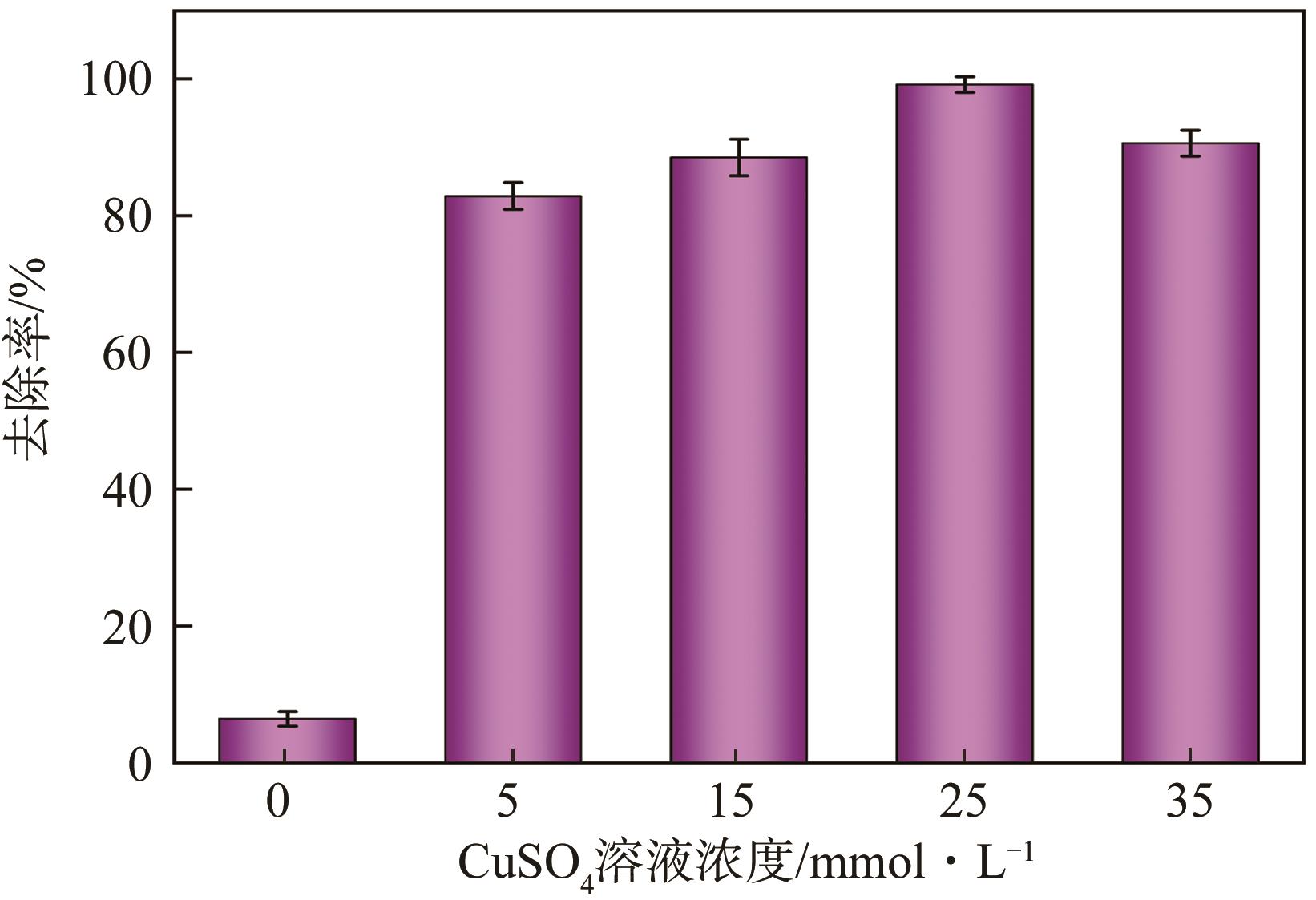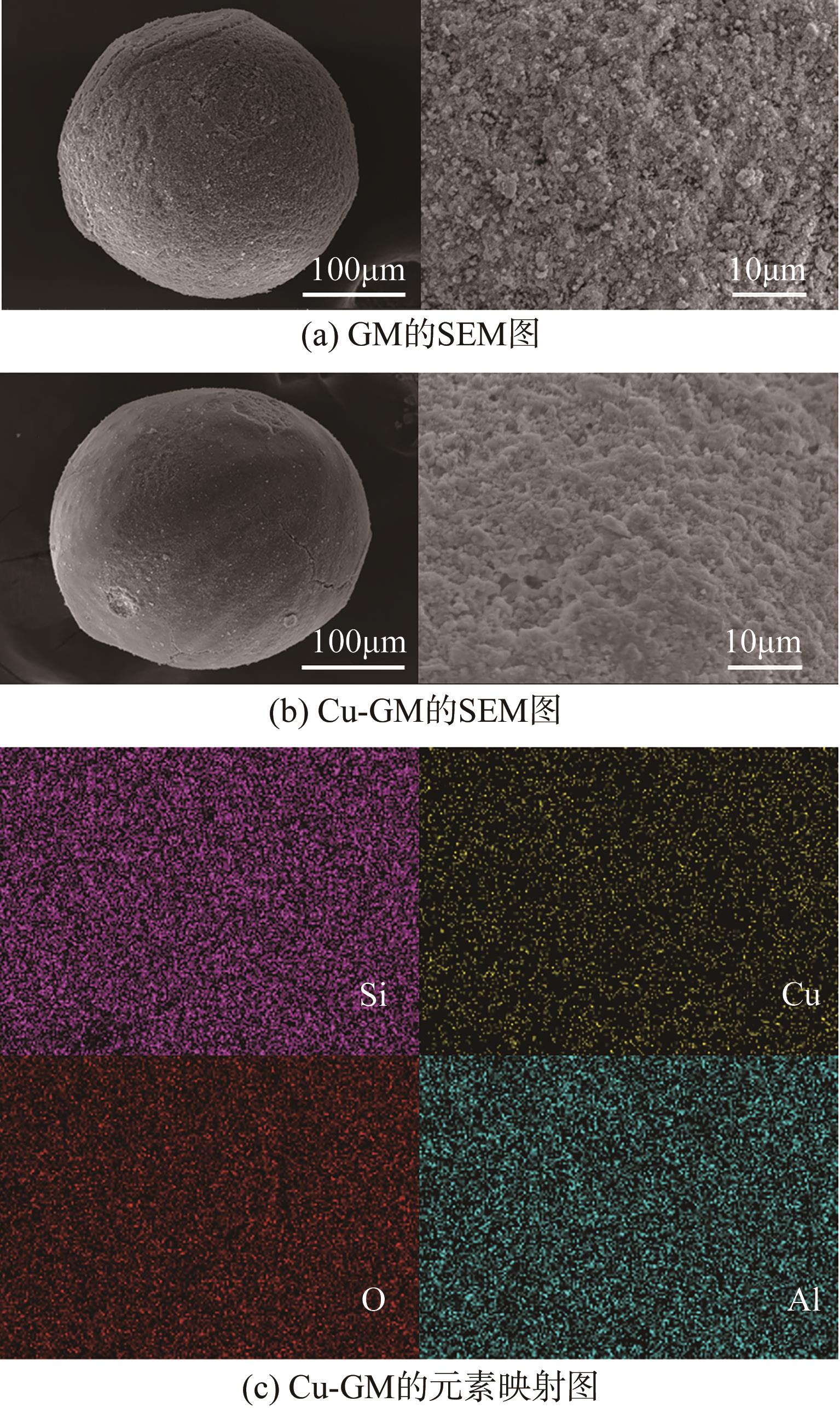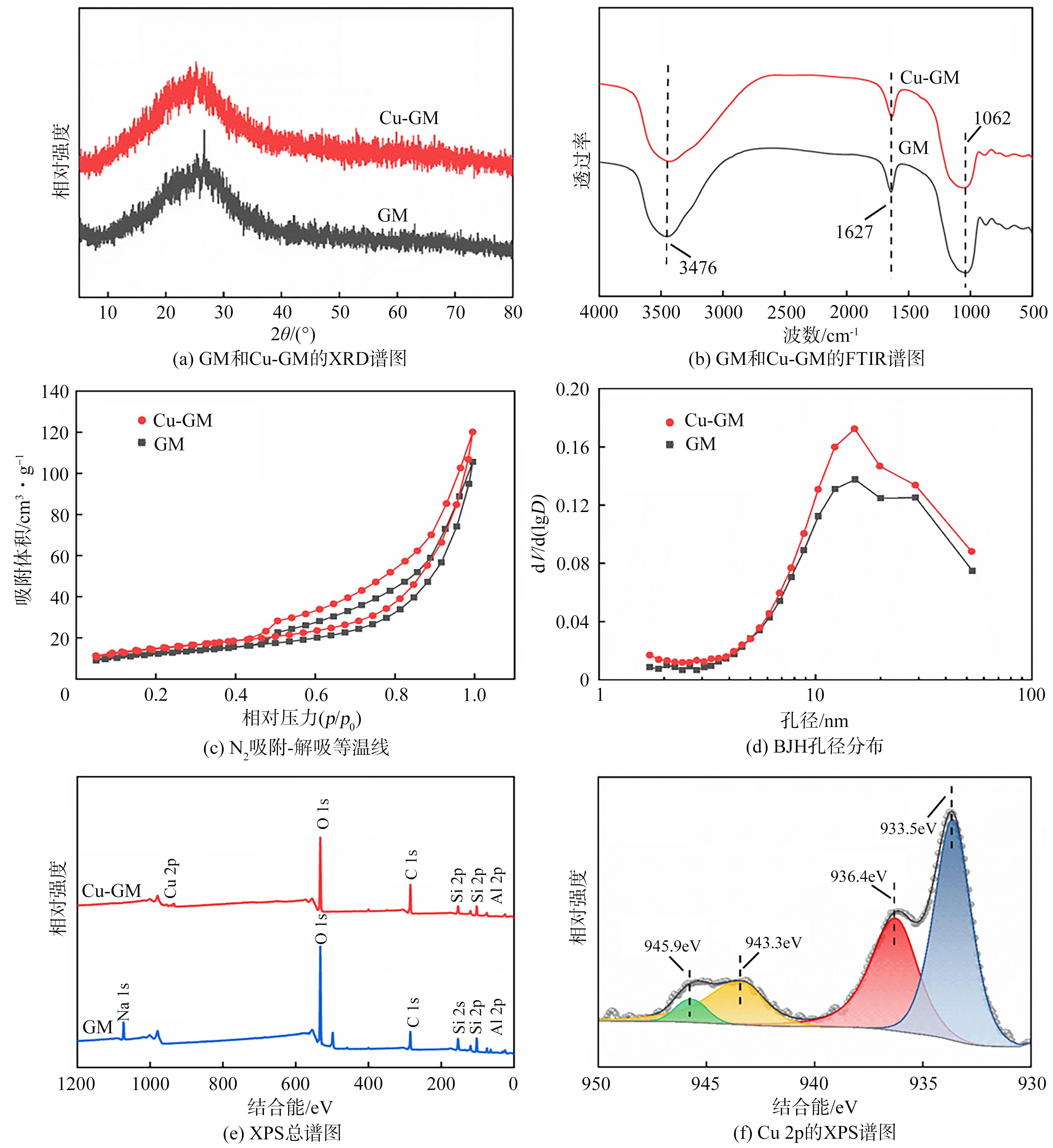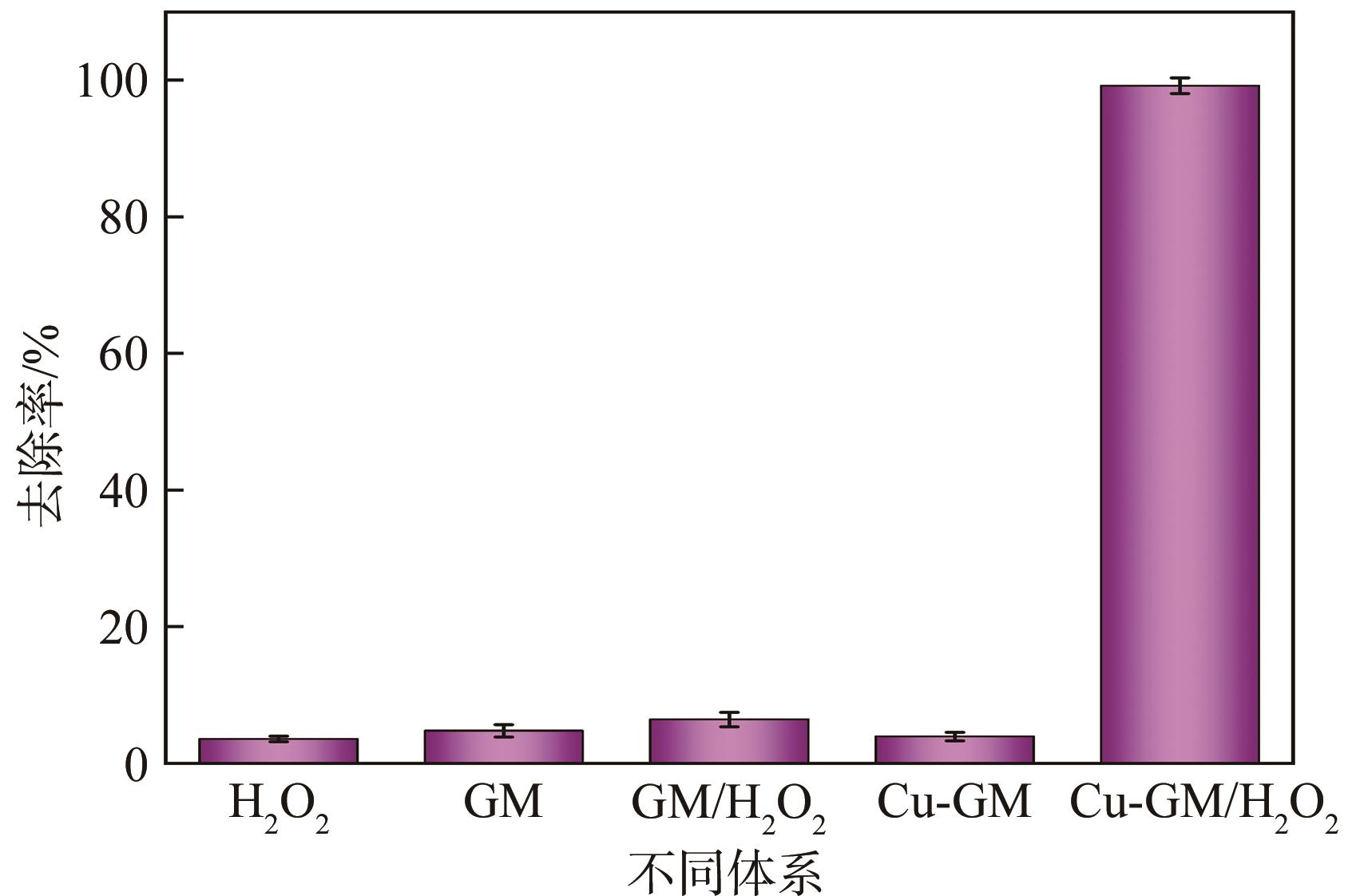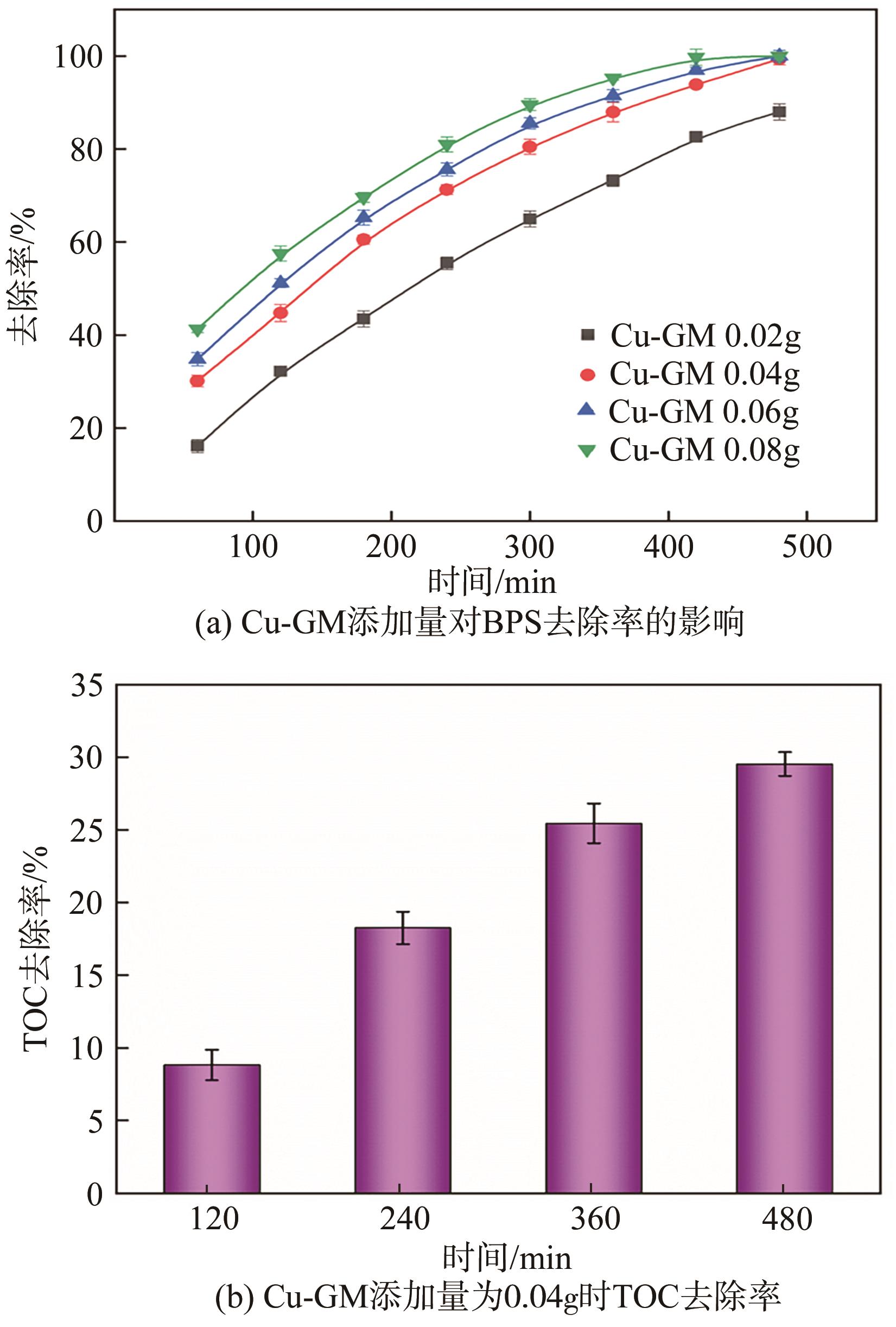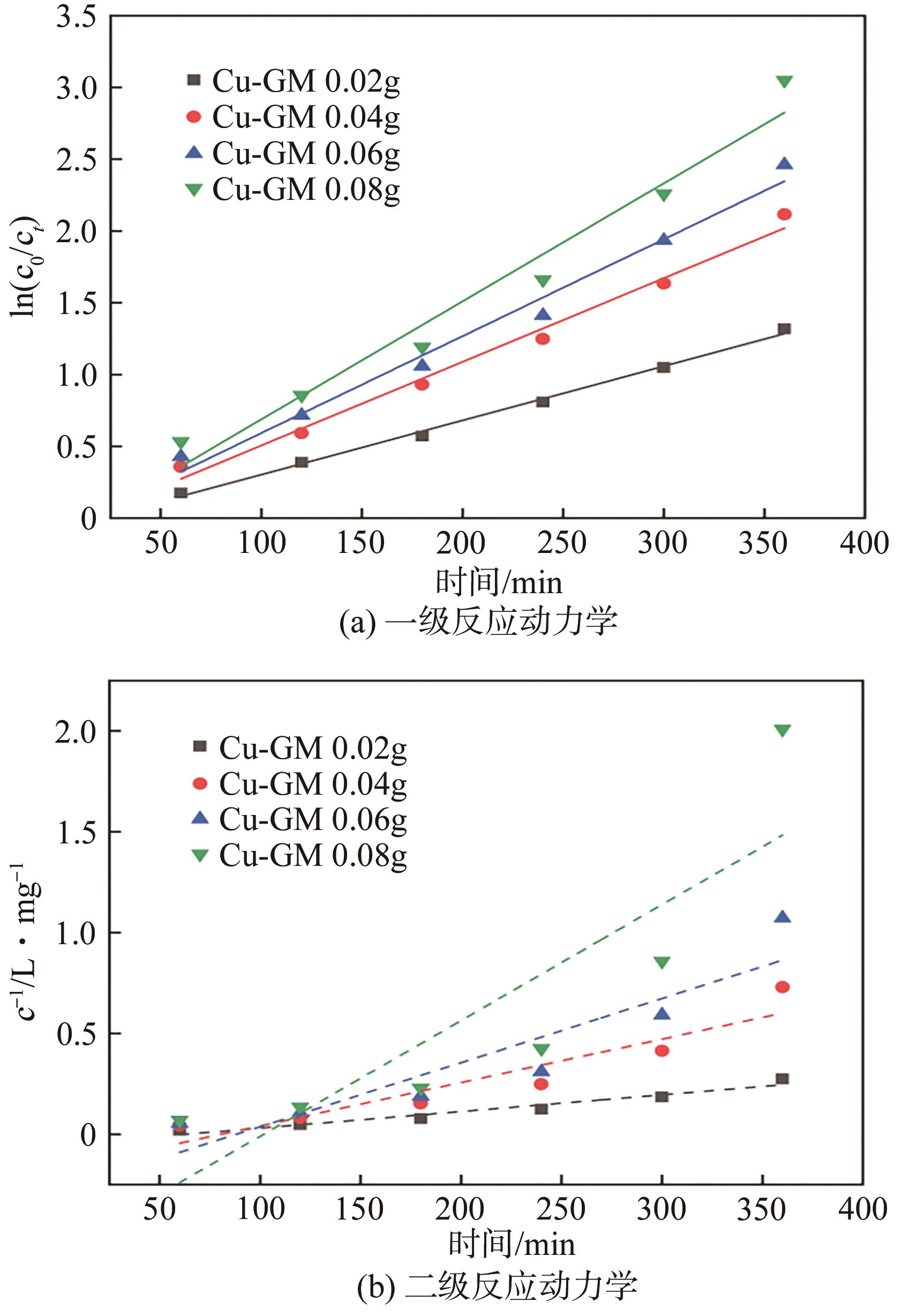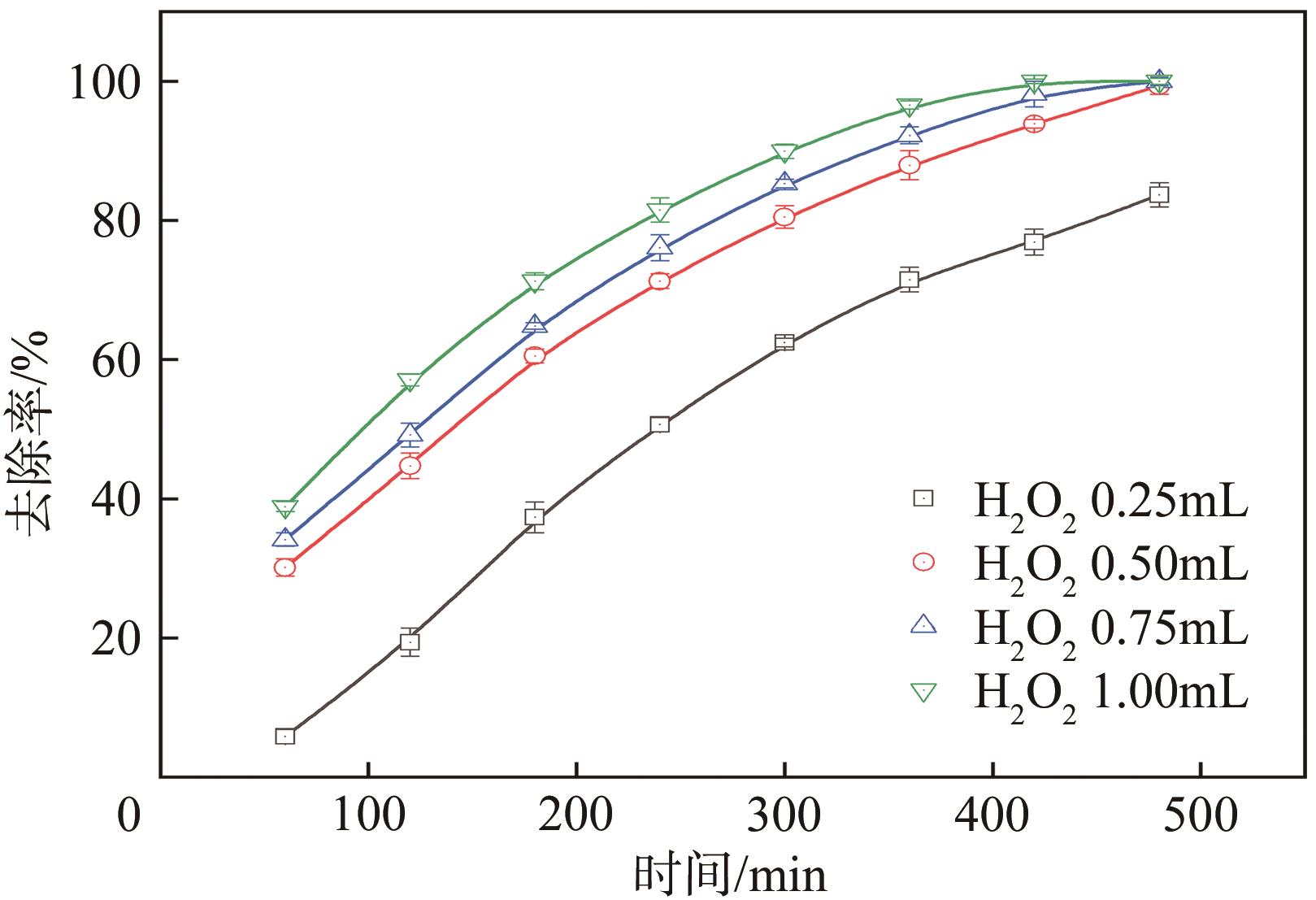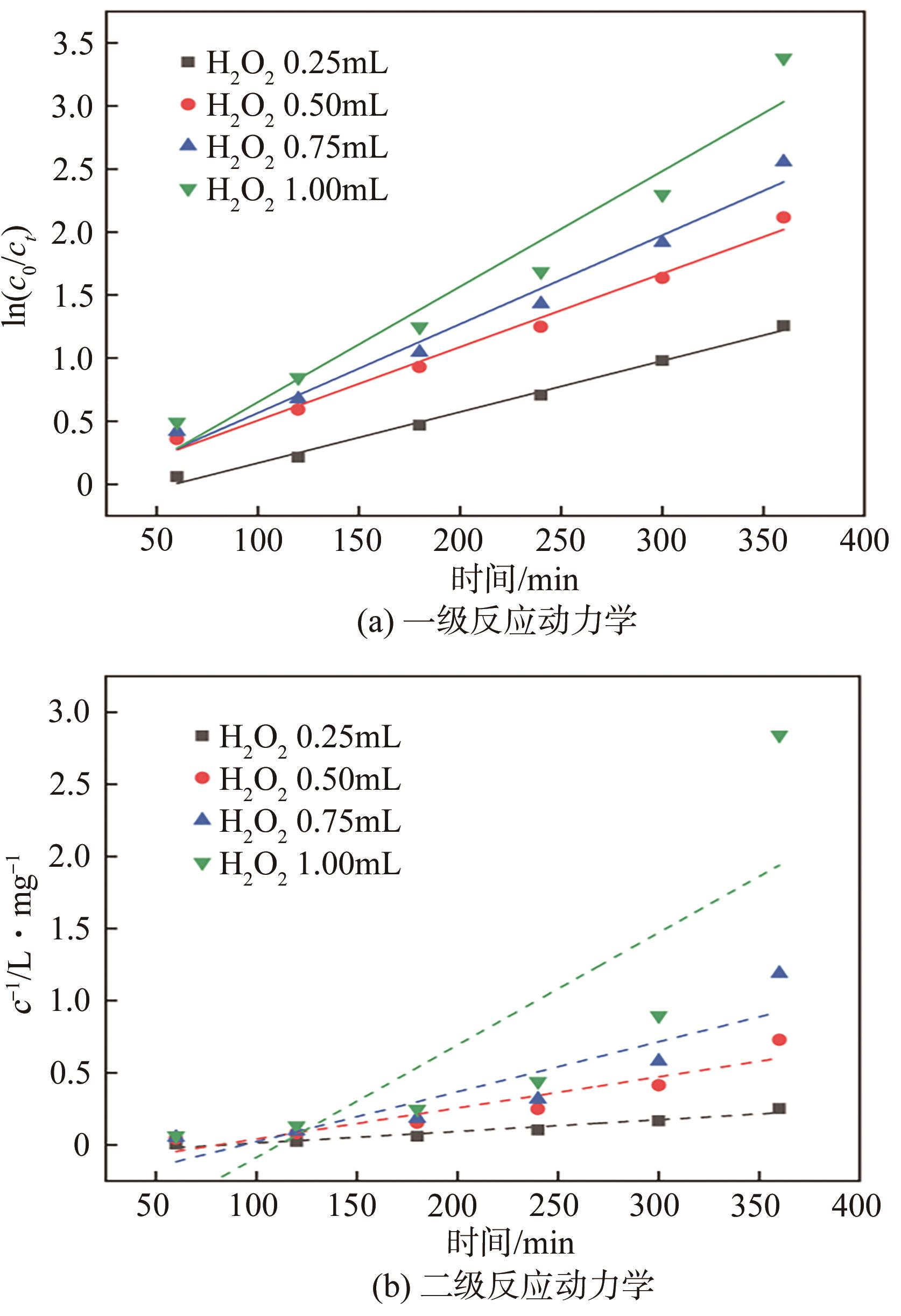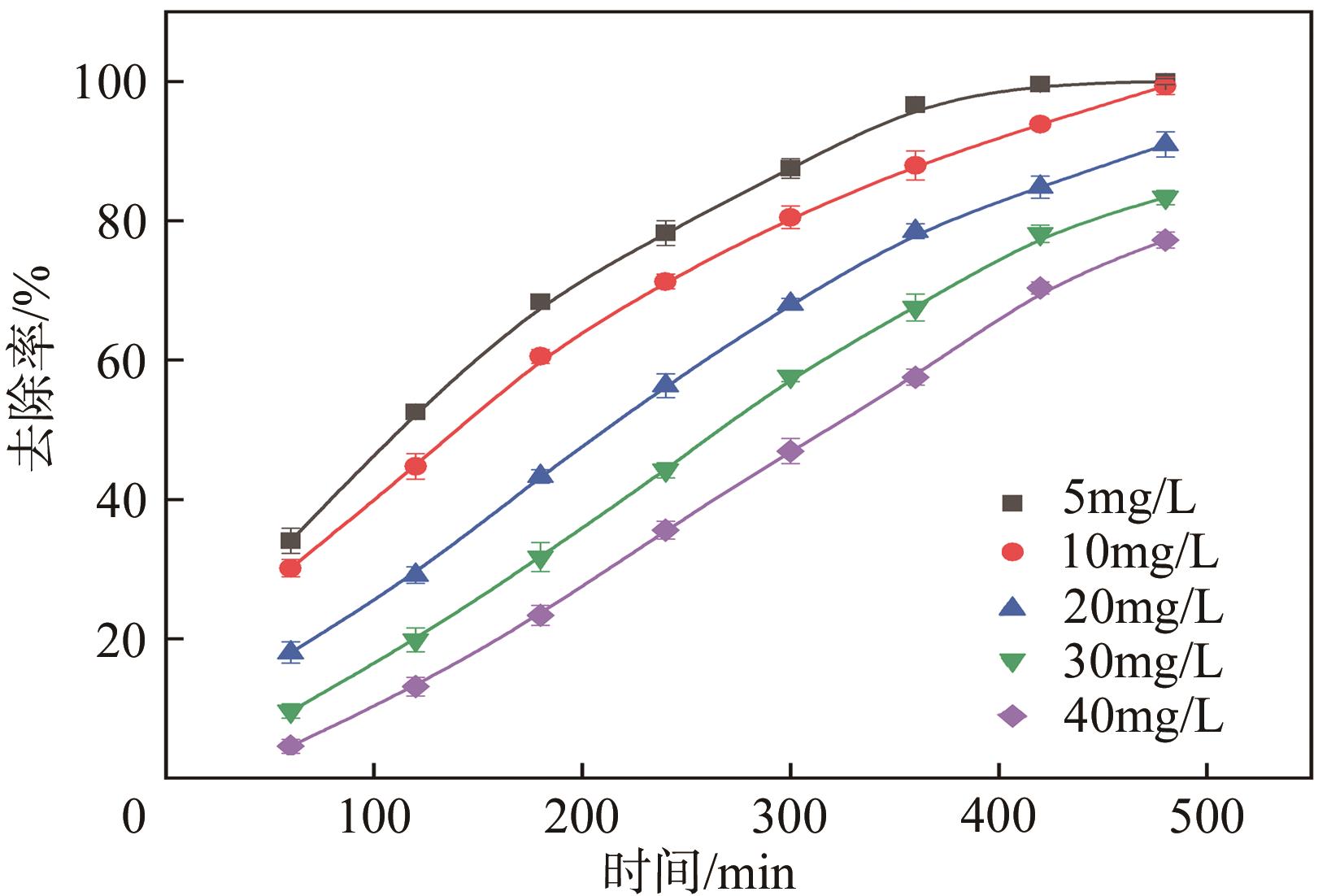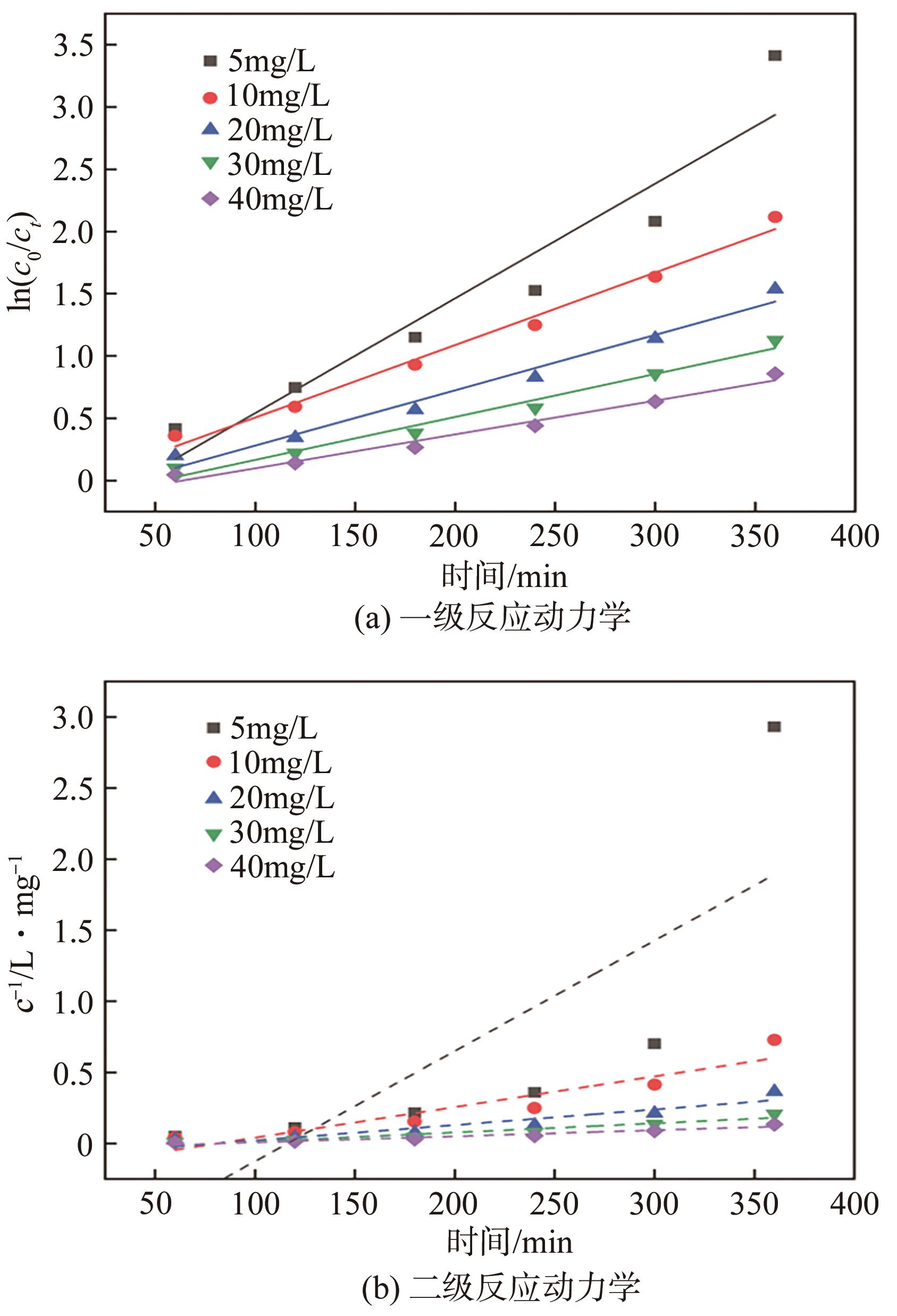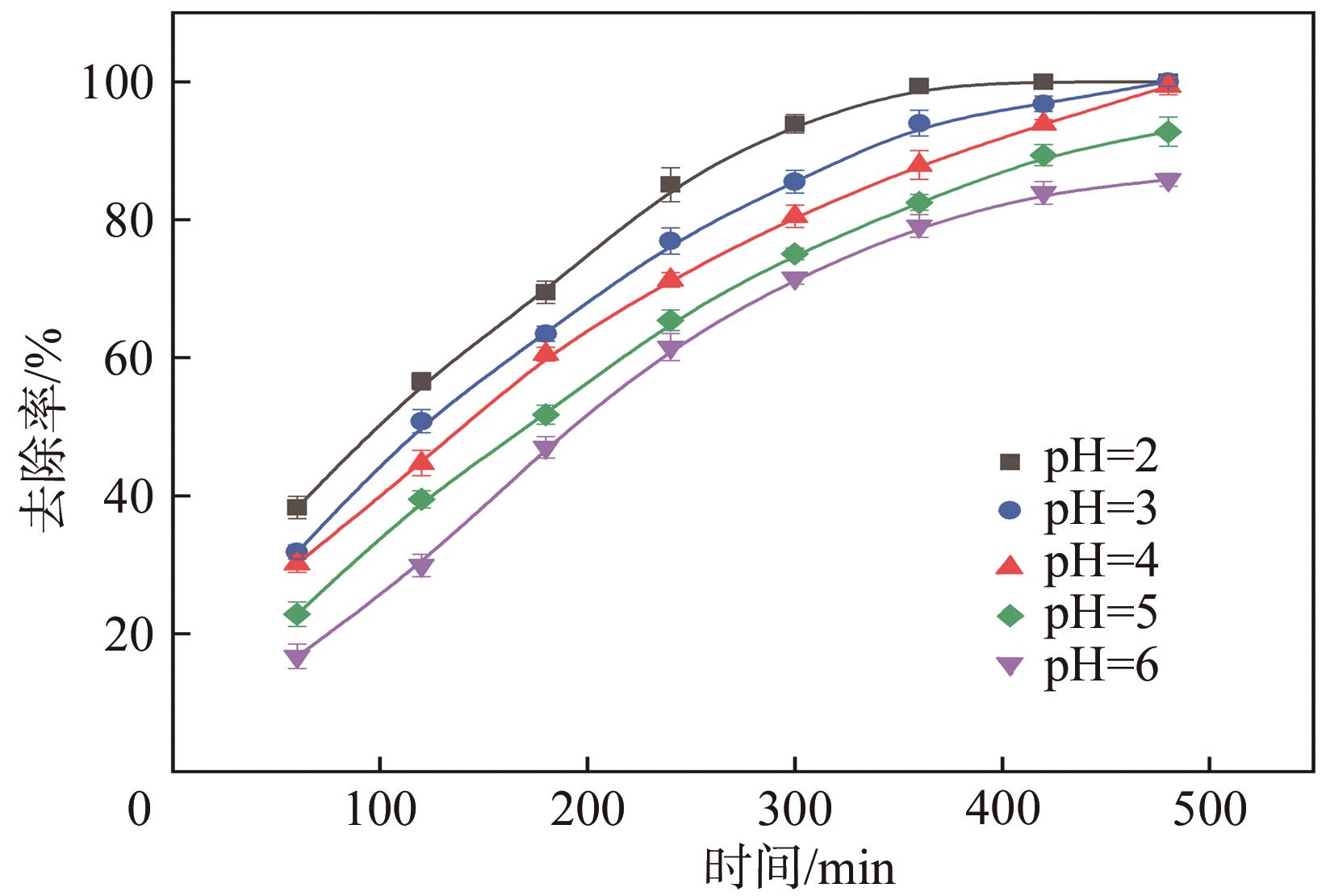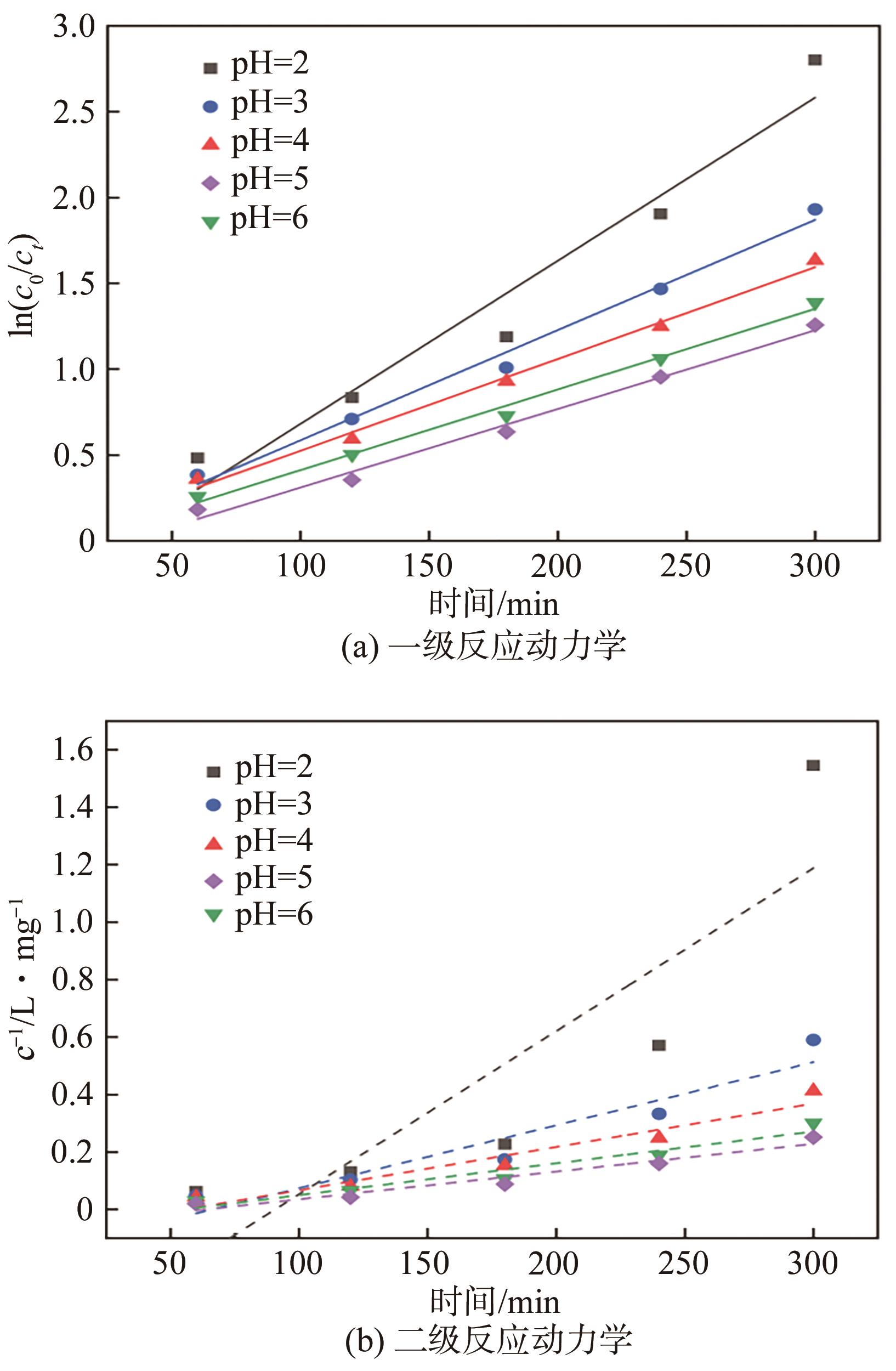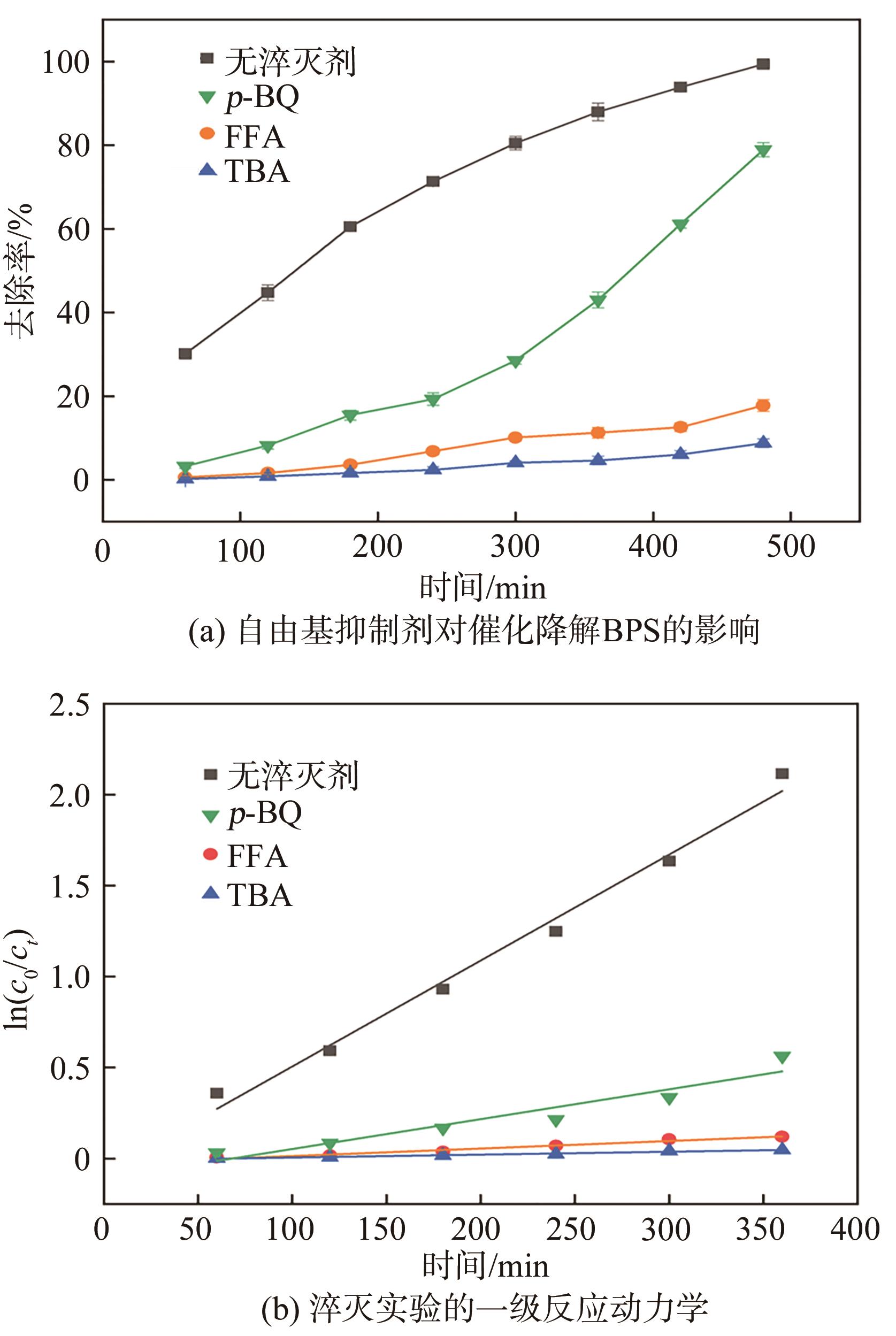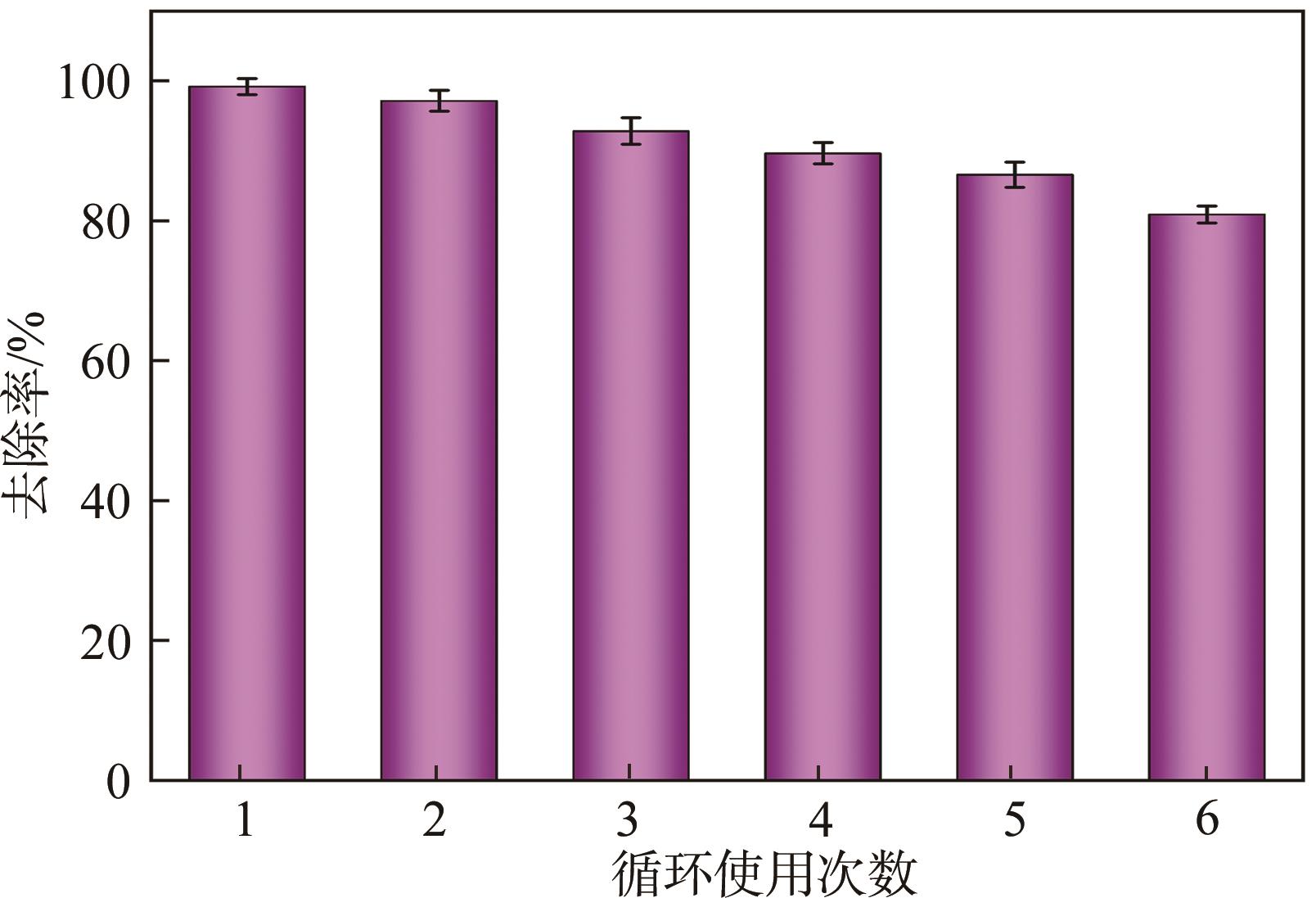Chemical Industry and Engineering Progress ›› 2024, Vol. 43 ›› Issue (9): 5290-5301.DOI: 10.16085/j.issn.1000-6613.2023-1322
• Resources and environmental engineering • Previous Articles
Preparation of copper-loaded geopolymer microspheres and their catalytic degradation of bisphenol S
ZHANG Zheng( ), LIU Lin, LI Zichen, WANG Mengqi, HUANG Chunyan, GE Yuanyuan(
), LIU Lin, LI Zichen, WANG Mengqi, HUANG Chunyan, GE Yuanyuan( )
)
- Guangxi Key Laboratory of Petrochemical Resource Processing and Process Intensification Technology, School of Chemistry and Chemical Engineering, Guangxi University, Nanning 530004, Guangxi, China
-
Received:2023-08-01Revised:2023-08-28Online:2024-09-30Published:2024-09-15 -
Contact:GE Yuanyuan
载铜地质聚合物微球的制备及其催化降解双酚S的性能
张政( ), 刘琳, 李子晨, 王梦琦, 黄春燕, 葛圆圆(
), 刘琳, 李子晨, 王梦琦, 黄春燕, 葛圆圆( )
)
- 广西大学化学化工学院,广西石化资源加工及过程强化技术重点实验室,广西 南宁 530004
-
通讯作者:葛圆圆 -
作者简介:张政(1998—),男,硕士研究生,研究方向为地聚物基环境功能材料。E-mail:zhangz0282@163.com。 -
基金资助:国家自然科学基金(22266006)
CLC Number:
Cite this article
ZHANG Zheng, LIU Lin, LI Zichen, WANG Mengqi, HUANG Chunyan, GE Yuanyuan. Preparation of copper-loaded geopolymer microspheres and their catalytic degradation of bisphenol S[J]. Chemical Industry and Engineering Progress, 2024, 43(9): 5290-5301.
张政, 刘琳, 李子晨, 王梦琦, 黄春燕, 葛圆圆. 载铜地质聚合物微球的制备及其催化降解双酚S的性能[J]. 化工进展, 2024, 43(9): 5290-5301.
share this article
Add to citation manager EndNote|Ris|BibTeX
URL: https://hgjz.cip.com.cn/EN/10.16085/j.issn.1000-6613.2023-1322
催化剂添加量 /g | 一级动力学模型参数 | 二级动力学模型参数 | ||
|---|---|---|---|---|
| k1×103/min -1 | R2 | k2×104/L·mg -1·min -1 | R2 | |
| 0.02 | 3.78 | 0.995 | 8.24 | 0.938 |
| 0.04 | 5.82 | 0.985 | 21.5 | 0.849 |
| 0.06 | 6.75 | 0.980 | 31.8 | 0.814 |
| 0.08 | 8.22 | 0.960 | 57.4 | 0.707 |
催化剂添加量 /g | 一级动力学模型参数 | 二级动力学模型参数 | ||
|---|---|---|---|---|
| k1×103/min -1 | R2 | k2×104/L·mg -1·min -1 | R2 | |
| 0.02 | 3.78 | 0.995 | 8.24 | 0.938 |
| 0.04 | 5.82 | 0.985 | 21.5 | 0.849 |
| 0.06 | 6.75 | 0.980 | 31.8 | 0.814 |
| 0.08 | 8.22 | 0.960 | 57.4 | 0.707 |
H2O2添加量 /mL | 一级动力学模型 | 二级动力学模型 | ||
|---|---|---|---|---|
| k1×103/min -1 | R2 | k2×104/L·mg -1·min -1 | R2 | |
| 0.25 | 4.05 | 0.992 | 8.06 | 0.931 |
| 0.50 | 5.82 | 0.985 | 21.5 | 0.848 |
| 0.75 | 7.05 | 0.972 | 34. 6 | 0.774 |
| 1.00 | 9.16 | 0.937 | 77.9 | 0.605 |
H2O2添加量 /mL | 一级动力学模型 | 二级动力学模型 | ||
|---|---|---|---|---|
| k1×103/min -1 | R2 | k2×104/L·mg -1·min -1 | R2 | |
| 0.25 | 4.05 | 0.992 | 8.06 | 0.931 |
| 0.50 | 5.82 | 0.985 | 21.5 | 0.848 |
| 0.75 | 7.05 | 0.972 | 34. 6 | 0.774 |
| 1.00 | 9.16 | 0.937 | 77.9 | 0.605 |
BPS浓度 /mg·L-1 | 一级动力学模型` | 二级动力学模型 | ||
|---|---|---|---|---|
| k1×103/min-1 | R2 | k2×104/L·mg-1·min-1 | R2 | |
| 5 | 9.22 | 0.896 | 77. 7 | 0.530 |
| 10 | 5.82 | 0.985 | 21.5 | 0.848 |
| 20 | 4.45 | 0.969 | 10.9 | 0.860 |
| 30 | 3.45 | 0.971 | 6.46 | 0.900 |
| 40 | 2.72 | 0.973 | 4.28 | 0.920 |
BPS浓度 /mg·L-1 | 一级动力学模型` | 二级动力学模型 | ||
|---|---|---|---|---|
| k1×103/min-1 | R2 | k2×104/L·mg-1·min-1 | R2 | |
| 5 | 9.22 | 0.896 | 77. 7 | 0.530 |
| 10 | 5.82 | 0.985 | 21.5 | 0.848 |
| 20 | 4.45 | 0.969 | 10.9 | 0.860 |
| 30 | 3.45 | 0.971 | 6.46 | 0.900 |
| 40 | 2.72 | 0.973 | 4.28 | 0.920 |
| pH | 一级动力学模型 | 二级动力学模型 | ||
|---|---|---|---|---|
| k1×103/min-1 | R2 | k2×104/L·mg-1·min-1 | R2 | |
| 2 | 9.51 | 0.938 | 414.8 | 0.376 |
| 3 | 6.42 | 0.986 | 44.0 | 0.676 |
| 4 | 5.35 | 0.991 | 21.5 | 0.848 |
| 5 | 4.70 | 0.989 | 1.68 | 0.899 |
| 6 | 4.58 | 0.985 | 4.87 | 0.921 |
| pH | 一级动力学模型 | 二级动力学模型 | ||
|---|---|---|---|---|
| k1×103/min-1 | R2 | k2×104/L·mg-1·min-1 | R2 | |
| 2 | 9.51 | 0.938 | 414.8 | 0.376 |
| 3 | 6.42 | 0.986 | 44.0 | 0.676 |
| 4 | 5.35 | 0.991 | 21.5 | 0.848 |
| 5 | 4.70 | 0.989 | 1.68 | 0.899 |
| 6 | 4.58 | 0.985 | 4.87 | 0.921 |
| 催化剂 | 外观形貌 | pH | 浓度/mg·L-1 | 去除率/% | 参考文献 |
|---|---|---|---|---|---|
| Cu-GM | 微米级球形 | 4 | 10 | 99.3 | 本文 |
| CuFe2O4/SBC | 纳米级颗粒 | 7 | 20 | 84.5 | [ |
| CoFe-PBA | 纳米级颗粒 | 5.89 | 20 | 73.77 | [ |
| A-boron | 纳米级颗粒 | 7 | 10 | 97.0 | [ |
| S-nZVI | 纳米级颗粒 | 5.6 | 5 | 92.8 | [ |
| CuCo2S4 | 纳米片 | 7.2 | 10μmol/L | 100 | [ |
| 催化剂 | 外观形貌 | pH | 浓度/mg·L-1 | 去除率/% | 参考文献 |
|---|---|---|---|---|---|
| Cu-GM | 微米级球形 | 4 | 10 | 99.3 | 本文 |
| CuFe2O4/SBC | 纳米级颗粒 | 7 | 20 | 84.5 | [ |
| CoFe-PBA | 纳米级颗粒 | 5.89 | 20 | 73.77 | [ |
| A-boron | 纳米级颗粒 | 7 | 10 | 97.0 | [ |
| S-nZVI | 纳米级颗粒 | 5.6 | 5 | 92.8 | [ |
| CuCo2S4 | 纳米片 | 7.2 | 10μmol/L | 100 | [ |
| 1 | XING Jianing, ZHANG Siyi, ZHANG Miaolian, et al. A critical review of presence, removal and potential impacts of endocrine disruptors bisphenol A[J]. Comparative Biochemistry and Physiology C: Toxicology & Pharmacology, 2022, 254: 109275. |
| 2 | SUN Xiaoli, PENG Junyu, WANG Muhua, et al. Determination of nine bisphenols in sewage and sludge using dummy molecularly imprinted solid-phase extraction coupled with liquid chromatography tandem mass spectrometry[J]. Journal of Chromatography A, 2018, 1552: 10-16. |
| 3 | LALWANI Dipa, RUAN Yuefei, TANIYASU Sachi, et al. Nationwide distribution and potential risk of bisphenol analogues in Indian waters[J]. Ecotoxicology and Environmental Safety, 2020, 200: 110718. |
| 4 | 侯爽, 隋倩. 华东地区某市重点行业优控环境激素的筛选及分布特征[J]. 化工进展, 2019, 38(2): 1140-1145. |
| HOU Shuang, SUI Qian. Screening and distribution of priority environmental hormones in the key industrial sectors in a city of East China[J]. Chemical Industry and Engineering Progress, 2019, 38(2): 1140-1145. | |
| 5 | EDAES Felipe Sanches, DE SOUZA Cleide Barbieri. BPS and BPF are as carcinogenic as BPA and are not viable alternatives for its replacement[J]. Endocrine, Metabolic & Immune Disorders Drug Targets, 2022, 22(9): 927-934. |
| 6 | MENDY Angelico, SALO Pӓivi M, WILKERSON Jesse, et al. Association of urinary levels of bisphenols F and S used as bisphenol A substitutes with asthma and hay fever outcomes[J]. Environmental Research, 2020, 183: 108944. |
| 7 | 国务院办公厅关于印发新污染物治理行动方案的通知[J]. 中华人民共和国国务院公报, 2022(16): 34-39. |
| Notice of The General Office of the State Council on printing and distributing the action plan for new pollutant control[J]. Gazette of the State Council of the People’s Republic of China, 2022(16): 34-39. | |
| 8 | WIEGAND Hanna Laura, Mischa JÜTTE, KLEIN Katharina, et al. Influences of pH, reagent dose, and water matrix components on the formation and utilization of hydroxyl radicals in the oxidation of bisphenol S and para-chlorobenzoic acid by the Fenton reaction[J]. ACS ES&T Water, 2023, 3(3): 629-638. |
| 9 | 胡德皓, 孙亮, 毛慧敏, 等. 芬顿氧化技术处理废水中难降解有机物的应用进展[J]. 山东化工, 2019, 48(7): 60-62. |
| HU Dehao, SUN Liang, MAO Huimin, et al. Research progress of the Fenton oxidation technology for treatment of refractory organics[J]. Shandong Chemical Industry, 2019, 48(7): 60-62. | |
| 10 | ZHAO Xiaoyu, ZHANG Zhenghua. FeOCl in advanced oxidization processes for water purification: A critical review[J]. Current Pollution Reports, 2023, 9(2): 143-164. |
| 11 | 李兴发, 胡浩栋, 王朝旭. 缓冲溶液法制备高效的铁基类芬顿催化剂[J]. 化工进展, 2020, 39(11): 4456-4461. |
| LI Xingfa, HU Haodong, WANG Chaoxu. Preparation of iron-based Fenton-like catalyst with high efficiency by buffer solution method[J]. Chemical Industry and Engineering Progress, 2020, 39(11): 4456-4461. | |
| 12 | THOMAS Nishanth, DIONYSIOU Dionysios D, PILLAI Suresh C. Heterogeneous Fenton catalysts: A review of recent advances[J]. Journal of Hazardous Materials, 2021, 404: 124082. |
| 13 | BONFIM Daniela P F, SANTANA Cássia S, BATISTA Marcelo S, et al. Catalytic evaluation of CuO/[Si]MCM-41 in Fenton-like reactions[J]. Chemical Engineering & Technology, 2019, 42(4): 882-888. |
| 14 | CAO Wenrui, HAN Muen, Lai LYU, et al. Efficient fenton-like process induced by fortified electron-rich O microcenter on the reduction state Cu-doped CNO polymer[J]. ACS Applied Materials & Interfaces, 2019, 11(18): 16496-16505. |
| 15 | LIAO Weixiang, Lai LYU, WANG Di, et al. Graphitized Cu-β-cyclodextrin polymer driving an efficient dual-reaction-center Fenton-like process by utilizing electrons of pollutants for water purification[J]. Journal of Environmental Sciences, 2023, 126: 565-574. |
| 16 | LIU Juan, CUI Jianan, ZHAO Tianyu, et al. Fe3O4-CeO2 loaded on modified activated carbon as efficient heterogeneous catalyst[J]. Colloids and Surfaces A: Physicochemical and Engineering Aspects, 2019, 565: 59-69. |
| 17 | LIU Hongrun, LIU Yuankun, LI Xing, et al. Adsorption and Fenton-like degradation of ciprofloxacin using corncob biochar-based magnetic iron-copper bimetallic nanomaterial in aqueous solutions[J]. Nanomaterials, 2022, 12(4): 579. |
| 18 | SHANGGUAN Zichen, YUAN Xingzhong, QIN Chencheng, et al. Improving the removal of tetracycline via carbonate-mediated triplet-excited state by the Cu-containing zeolites activated percarbonate[J]. Chemical Engineering Journal, 2023, 457: 141046. |
| 19 | SAZAMA Petr, BORTNOVSKY Oleg, Jiří DĚDEČEK, et al. Geopolymer based catalysts—New group of catalytic materials[J]. Catalysis Today, 2011, 164(1): 92-99. |
| 20 | THAKUR Nimisha, Farooq WAHAB M, KHANAL Durga D, et al. Synthetic aluminosilicate based geopolymers—Second generation geopolymer HPLC stationary phases[J]. Analytica Chimica Acta, 2019, 1081: 209-217. |
| 21 | TANG Qing, GE Yuanyuan, WANG Kaituo, et al. Preparation and characterization of porous metakaolin-based inorganic polymer spheres as an adsorbent[J]. Materials & Design, 2015, 88: 1244-1249. |
| 22 | THAKUR Nimisha, ARMSTRONG Daniel W. Arsenic sequestration by iron oxide coated geopolymer microspheres[J]. Journal of Cleaner Production, 2021, 291: 125931. |
| 23 | YU Zefeng, SONG Weifeng, LI Jiayao, et al. Improved simultaneous adsorption of Cu(Ⅱ) and Cr (Ⅵ) of organic modified metakaolin-based geopolymer[J]. Arabian Journa of Chemistry, 2020, 13(3): 4811-4823. |
| 24 | GE Yuanyuan, CUI Xuemin, KONG Yan, et al. Porous geopolymeric spheres for removal of Cu(Ⅱ) from aqueous solution: Synthesis and evaluation[J]. Journal of Hazardous Materials, 2015, 283: 244-251. |
| 25 | SHAN Haidi, WANG Xiaoyun, GE Yuanyuan, et al. Homologous amino acids promoted co-immobilization of laccase and mediator onto geopolymer microspheres for enhancing degradation of dyes in water[J]. Journal of Hazardous Materials, 2022, 423: 127107. |
| 26 | WANG Xiaoyun, ZHANG Zheng, GE Yuanyuan. Oleic acid-tailored geopolymer microspheres with tunable porous structure for enhanced removal from tetracycline in saline water[J]. Sustainability, 2022, 14(11): 6705. |
| 27 | UPADHYAY Jyoti, MISRA Swayam Prabha, IRUSTA Silvia, et al. Oxidation of aldehydes to carboxylic acids over geopolymer supported CuO[J]. Molecular Catalysis, 2023, 536: 112911. |
| 28 | SALAM Mohamed Abdel, MOKHTAR Mohamed, ALBUKHARI SOHA M, et al. Insight into the role of the zeolitization process in enhancing the adsorption performance of kaolinite/diatomite geopolymer for effective retention of Sr(Ⅱ) ions; batch and column studies[J]. Journal of Environmental Management, 2021, 294: 112984. |
| 29 | WU Honghai, XIE Hanrui, HE Guangping, et al. Effects of the pH and anions on the adsorption of tetracycline on iron-montmorillonite[J]. Applied Clay Science, 2016, 119: 161-169. |
| 30 | REN Yi, LIU Chao, LI Naiwen, et al. A bimetallic co-doped iron and copper in polymeric graphitic carbon nitride to enhance catalytic activity and reusability of Fenton-like oxidation[J]. Separation and Purification Technology, 2023, 316: 123782. |
| 31 | CHEN Aitao, XIAO Jun, KONG Xiao, et al. Regulating the charge density of Cu(Ⅰ) single sites enriched on the surface of N3c vacancies-engineered g-C3N4 for efficient Fenton-like reactions[J]. Separation and Purification Technology, 2023, 314: 123525. |
| 32 | KURODA Yasushige, ITADANI Atsushi, KUMASHIRO Ryotaro, et al. Anomalous valence changes and specific dinitrogen adsorption features of copper ion exchanged in ZSM-5 zeolite prepared from an aqueous solution of [Cu(NH3)2]+ [J]. Physical Chemistry Chemical Physics, 2004, 6(9): 2534-2541. |
| 33 | LIU Yong, FAN Qin, WANG Jianlong. Zn-Fe-CNTs catalytic in situ generation of H2O2 for Fenton-like degradation of sulfamethoxazole[J]. Journal of Hazardous Materials, 2018, 342: 166-176. |
| 34 | 刘创创, 王逸, 周丽华, 等. 纳米N-C/ZrO2活化过硫酸盐降解苯酚的机理研究[J]. 环境科学学报, 2021, 41(10): 3956-3968. |
| LIU Chuangchuang, WANG Yi, ZHOU Lihua, et al. The mechanism on activation of peroxymonosulfate using nano N-C/ZrO2 for phenol degradation[J]. Acta Scientiae Circumstantiae, 2021, 41(10): 3956-3968. | |
| 35 | WANG Lihong, JIANG Jin, MA Jun, et al. A review on advanced oxidation processes homogeneously initiated by copper(Ⅱ)[J]. Chemical Engineering Journal, 2022, 427: 131721. |
| 36 | YANG Youwei, GUO Changsheng, ZENG Yiting, et al. Peroxymonosulfate activation by CuFe-Prussian Blue analogues for the degradation of bisphenol S: Effect, mechanism, and pathway[J]. Chemosphere, 2023, 331: 138748. |
| 37 | WANG Bingyu, LI Qiaoqiao, Ying LYU, et al. Insights into the mechanism of peroxydisulfate activated by magnetic spinel CuFe2O4/SBC as a heterogeneous catalyst for bisphenol S degradation[J]. Chemical Engineering Journal, 2021, 416: 129162. |
| 38 | 杨有威, 曾亦婷, 郭昌胜, 登. 类普鲁士蓝的制备及其活化PMS降解双酚S[J]. 化工进展, 2023, 42(12): 6676-6686. |
| YANG Youwei, ZENG Yiting, GUO Changsheng, et al. Preparation of Prussian Blue and its activation of PMS for degrading bisphenol S[J]. Chemical Industry and Engineering Progress, 2023, 42(12): 6676-6686. | |
| 39 | SHAO Penghui, DUAN Xiaoguang, XU Jun, et al. Heterogeneous activation of peroxymonosulfate by amorphous boron for degradation of bisphenol S[J]. Journal of Hazardous Materials, 2017, 322: 532-539. |
| 40 | CAI Jing, ZHANG Yan. Enhanced degradation of bisphenol S by persulfate activated with sulfide-modified nanoscale zero-valent iron[J]. Environmental Science and Pollution Research, 2022, 29(6): 8281-8293. |
| 41 | XU Haodan, WANG Da, MA Jun, et al. A superior active and stable spinel sulfide for catalytic peroxymonosulfate oxidation of bisphenol S[J]. Applied Catalysis B: Environmental, 2018, 238: 557-567. |
| [1] | YANG Youwei, ZENG Yiting, GUO Changsheng, LUO Yuxia, GAO Yan, WANG Chunying. Preparation of Prussian blue and its activation of PMS for degrading bisphenol S [J]. Chemical Industry and Engineering Progress, 2023, 42(12): 6676-6686. |
| [2] | FU Jia, CHEN Lunjian, XU Bing, HUA Shaofeng, LI Congqiang, YANG Mingkun, XING Baolin, YI Guiyun. Microbial degradation of phenol in simulated coal gasification wastewater [J]. Chemical Industry and Engineering Progress, 2023, 42(1): 526-537. |
| [3] | YI Xuenong, LI Jingmei, GAO Yuqiong. Oxidative degradation of naproxen in water by UV-Fe(Ⅵ) process [J]. Chemical Industry and Engineering Progress, 2022, 41(8): 4562-4570. |
| [4] | ZHOU Yongquan, ZHANG Ai, LIU Yanan, WANG Zheng. Removal of glucocorticoids from aqueous solution by plasma jet combined with activated carbon fiber [J]. Chemical Industry and Engineering Progress, 2022, 41(4): 2209-2215. |
| [5] | ZHAI Chongyuan, ZHAO Dandi, HE Yapeng, HUANG Hui, CHEN Buming, GUO Zhongcheng. Recent development on boron-doped diamond anodes in electrochemical degradation of emerging antibiotic pollutants [J]. Chemical Industry and Engineering Progress, 2022, 41(12): 6615-6626. |
| [6] | WANG Jikun, LI Yang, CHEN Guifeng, LIU Min, KOU Lihong, WANG Qi, HE Yicong. Catalytic oxidation mechanism of organics degradation by ozone in high-salt wastewater of coal chemical industry [J]. Chemical Industry and Engineering Progress, 2022, 41(1): 493-502. |
| [7] | HUANG Jiaqi, GE Yuanyuan, LI Zhili, WANG Yipin, CUI Xuemin. Preparation of biochar/geopolymer composite film and its removal of tetracycline [J]. Chemical Industry and Engineering Progress, 2022, 41(1): 427-434. |
| [8] | Yanhong LUO, Xiuping YUE, Yueru JIANG, Bowei ZHAO, Yanjuan GAO, Yanqing DUAN. Recent progress of advanced oxidation processes in indole degradation [J]. Chemical Industry and Engineering Progress, 2021, 40(2): 1025-1034. |
| [9] | Shuo YANG, Weiwei YU, Lun YANG, Banghao DU, Mingyuan XIE, Chenju ZHAO, Qiaoling WAN, Weiliang PAN. Degradation mechanism of 17β-estradiol by nano-zero valent iron in aqueous solution [J]. Chemical Industry and Engineering Progress, 2020, 39(9): 3826-3834. |
| [10] | Chaocheng ZHAO, Guangrui WU. Research progress on the mechanism and applications of MOFs composite materials for catalytic degradation of organic pollutants in the solution [J]. Chemical Industry and Engineering Progress, 2019, 38(04): 1775-1784. |
| [11] | CUI Xi, LIU Bingling, HE Chongheng, TIAN Hengshui. Research on thermal degradation mechanism and thermal stability of aliphatic polyether-polyurethane elastomer [J]. Chemical Industry and Engineering Progress, 2016, 35(11): 3585-3589. |
| [12] | YE Linjing, AN Xiaoying, JIANG Yunjie, YAN Chao, GUAN Weisheng. Preparation of ZnO/CdS composite photocatalyst and its degradability on tetracycline antibiotic [J]. Chemical Industry and Engineering Progree, 2015, 34(11): 3944-3950. |
| [13] | ZHANG Jinyong1,2,LIU Ji1,CHEN Yu1,YANG Mingde1,WU Yulong1. Effects of atmosphere pretreatment on the catalytic activity of Pd/γ-Al2O3 catalyst in benzene degradation [J]. Chemical Industry and Engineering Progree, 2014, 33(11): 3107-3111. |
| [14] | JIA Yichao1,XIAO Peng1,LI Dongxian2,ZHANG Yunhuai1. Research progresses in preparation and application of TiO2 nanotube arrays composites [J]. Chemical Industry and Engineering Progree, 2011, 30(11): 2443-. |
| [15] |
LIU Pan1,3,GUO Xiaoning2,NAN Hao2,LIU Hong2,LI Shengnan1.
Catalytic degradation mechanism of rhodamine B by photocatalyst prepared from furnace slag [J]. Chemical Industry and Engineering Progree, 2010, 29(6): 1075-. |
| Viewed | ||||||
|
Full text |
|
|||||
|
Abstract |
|
|||||
